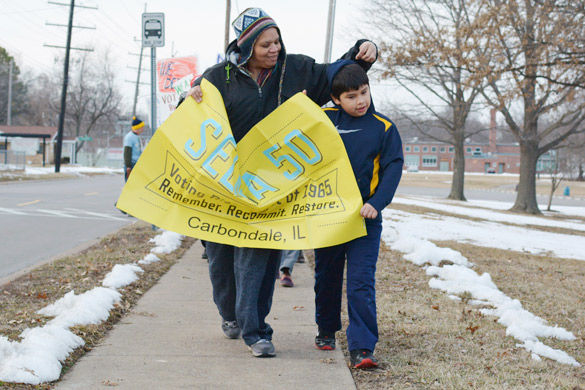Selma is remembered 50 years later

March 2, 2015
People took to Carbondale’s streets Monday to commemorate the historic march that won voting rights for African-Americans.
Carbondale citizens remembered the 50th anniversary of the march from Selma, Ala., to Montgomery Ala., which played a role in enacting the Voting Rights Act of 1965. They walked from the Eurma C. Hayes Center to Carbondale City Hall.
The event, hosted by the African-American Museum of Southern Illinois, brought out about 25 participants.
Advertisement
D. Gorton, of Carbondale, said he participated in the momentous march to Montgomery a half-century ago and the one that took place Monday.
“I would have never predicted that 50 years later people would remember it,” he said. “I was 23 years old and didn’t know much about the way history worked.”
Gorton, who was a student at the University of Mississippi at the time, said he joined the civil rights movement after seeing the discrimination against African-Americans at voting polls.
Randy Burnside, a speaker at the reception that followed the march, said voting discrimination still exists, citing the Supreme Court’s 2013 decision in the Shelby County v. Holder case.
The decision—which was 5-4 in favor Shelby County, Ala.—nullified Section IV of the Voting Rights Act of 1965. The decision ended the “preclearance” requirement that forced municipalities with histories of discrimination to get approval of changes in voting procedures.
Now, a town that restricted voting rights of black people in the past will not need federal clearance to change rules at the polls.
“It takes away the checks that were there to ensure that discriminatory practices were not taking place,” Burnside said.
Advertisement*
President Barack Obama and Attorney General Eric Holder criticized the decision for weakening the nation’s most effective civil rights legislation, but the court said the preclearance rule was outdated.
Burnside said voter identification laws in some state have kept polling discrimination alive.
He cites an October report by the Government Accountability Office, which found that most people turned away at polls were non-whites and under the age of 24.
“People with money are going to be able to vote, people with influence are going to be able to vote. Who do these laws impact the most?” he said. “Younger people and people of color and poor people.”
Burnside urged Congress to take action to reverse restrictions on voting.
“The Voting Rights Act is governed by Congress and it has to be renewed,” he said. “Congress can pass legislation at any time to protect the rights of voters.”
But at least one state representative does not believe the problem lies with the law.
Rep. Terri Bryant, R-Murphysboro, said having valid identification is not too much to ask of potential voters.
“You have to have identification to get on an airplane, you have to have two forms of identifications to get license plates,” she said. “We’re still arguing whether or not a person should have to prove who they are to exercise one of the greatest rights in this country? I don’t understand why that’s a problem.”
Bryant said she planned to walk with the group commemorating the anniversary of Selma but could not after she was called to Springfield. She said voter fraud is one reason why identification laws are necessary.
However, Burnside said a driver’s license or ID card, which costs $30 in Illinois, is expensive for some people in urban communities who do not need to drive.
Bryant said there are other ways to aid those who want to vote without eliminating identification laws.
“If the issue is that a person can’t afford an identification card, then we need to fix that and make it affordable for someone to get an identification card,” Bryant said. “We don’t go the other direction and say ‘they don’t have to have an identification card when they vote.’”
She said the Legislature should reconsider the affordability of voter requirements if some people are excluded. Illinois requires an ID in limited situations—for new voters who register by mail, early voters and voters challenged by a judge.
Burnside encouraged students to contact their representatives if they are subject to discrimination.
“Young people and poor people and students and people of color need to be cognizant of who they’re putting into those elected positions,” he said. “What are their stands on these types of issues, on these discriminatory practices? Then try to put people in those positions that are going to be supportive of those laws that protect the sanctity of voting as a universal right for all Americans.”
Tyler Davis can be reached at [email protected]
Advertisement







